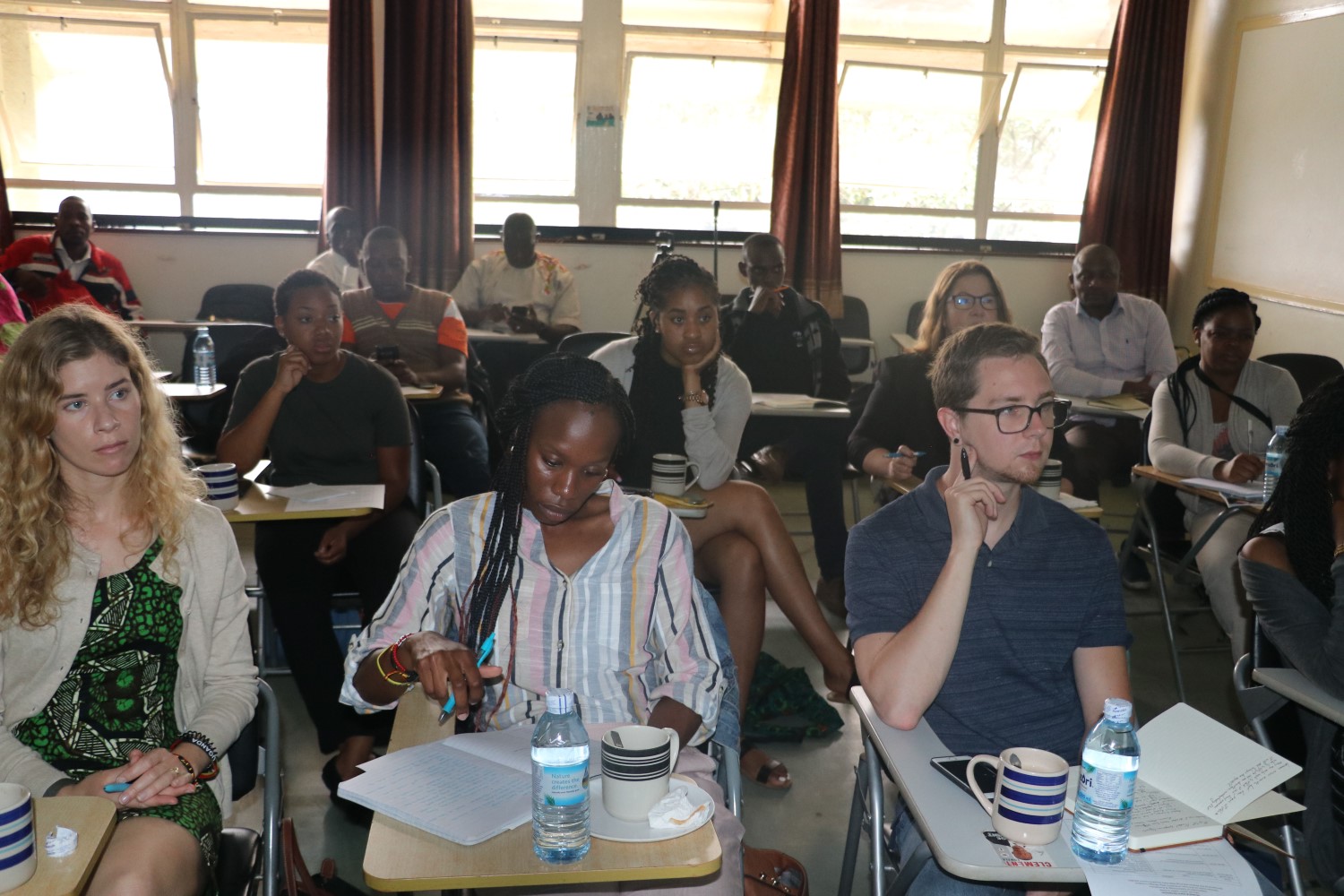
(Students from Georgia State University in the US who attended the Alcohol and harm reduction symposium, standing outside the Makerere University School of Public Health Building in Mulago. Fore-front, 3rd left is Prof. Nazarius Mbona. On his right is Prof. Monica Swahn from Georgia State University.)
Prof. Nazarius Tumwesigye of Makerere University School of Public Health (MakSPH) has urged policy makers to pass new laws that will address the rising levels of alcohol abuse in Uganda.
Speaking at the Alcohol and Harm Symposium Seminar held at MakSPH on 24th May 2019, Prof Tumwesigye said Ugandan laws are old and inefficient to curb alcohol abuse.
"The laws are very weak and archaic,” he noted, explaining that when you are caught selling alcohol illegally, you pay a paltry 3000 shillings which is a mockery. Because the penalty is laughable, alcohol is consumed with reckless abandon. He welcomed government's recent move to ban alcohol sold in sachets, as timely.
In his presentation, the passionate professor made shocking revelations about the rising number of people brought to health facilities with alcohol-related illness in the Country. The finding were from a preliminary report for a study done in northern Uganda which showed that northern Uganda has the highest increase in the number of people with alcohol-related illnesses. East and Central Uganda reported the lowest cases. The report also highlighted Western Uganda as having a spike in alcohol-related illnesses since 2016. Equally shocking were WHO records which show that 90% of alcohol consumed in Uganda is produced informally, with waragi (alcohol in sachets) being the most common, the presentation read.
Prof. Tumwesigye added that researchers are still trying to figure out why the numbers of alcohol-related illnesses are rising. Some of the probable reasons could be the rising levels of income and the numerous offers of alcohol given during the election period.
Speaking in terms of seasonal patterns that were recorded during the study, Prof. Tumwesigye noted that a spike in alcohol morbidity was observed towards the end of the year. “This is because, during the festive seasons, many people gather and celebrate using beer,” he explained
Health Risks
On gender patterns, the report revealed that women are more affected because of their genetic make-up. Prof. Mbona explained that for the same amount of alcohol, women become more intoxicated than men which directly affects their physical and mental ability.
Also at the seminar, Mr. Toko Santiago of Palliative Care Uganda noted that Uganda's capital alcohol consumption stands at 9.8 hence the need to push for new policies that can reduce that level of consumption. Capital Alcohol Consumption of a country refers to… Mr. Santiago was making a presentation on the culture of alcohol in Uganda.Mr. Toko added that waragi causes lower levels of productivity and liver cancer and is thus a serious matter that should be handled accordingly.
In his presentation, Dr Godfrey Bbosa from the Department of Pharmacology and Therapeutics, College of Health Sciences at Makerere University, noted that alcohol consumption becomes complicated when addiction kicks in. He explained that taking huge quantities of alcohol can lead to the suppression of body organs. Dr. Bbosa was presenting a paper titled, “Tools for Screening Alcoholic Beverages Abuse among Exposed Individuals.” Citing a UN report, Dr Bbosa, noted that at least 85 per cent of the alcohol consumed in Uganda is unregulated, home brewed and illegally sold. He therefore stressed the need for sensitization in schools and communities to curb its consumption.
In her presentation, Prof. Monica Swan of Georgia State University, also wondered why marketing agencies in Uganda employ youth and offer them alcohol as part of brand promotion. In Uganda, it has been noted that beer companies employ children younger than 18 in their promotions for example to dance on trucks that advertise their products in preparation for an event. “This is unthinkable in the US,” she remarked. The professor said the development of new policy should be extradited to cut down on the high level of alcohol consumption. She also called upon health stakeholders like doctors and the general public to reveal factual information to researchers as part of tackling the alcohol syndrome. Prof. Swahn made a presentation on “Alcohol Use & High Risk Behavior among Youth in Kampala.”
Prof. Noah Kiwanuka, also from MakSPH made a presentation on the “Alcohol Attributed Fraction of HIV Incidence in Uganda.” Another presentation as made by Dr. Aloysius Rukundo who teaches Educational Foundations & Psychology at Mbarara University. It was titled, “Exploring Alcohol Consumption and Injury among Boda Boda Youth Motorcyclists in Kampala, Uganda.”
The Alcohol and Harm Symposium was a partnership between MakSPH and Georgia State University (GSU) together with the Alcohol Drugs and Addiction Research (ADARC) as the main organiser. It was attended by students from MakSPH, students on an exchange visit from Georgia State University, officials from the Ministry of health and other organisations that work in alcohol and harm reduction efforts.


